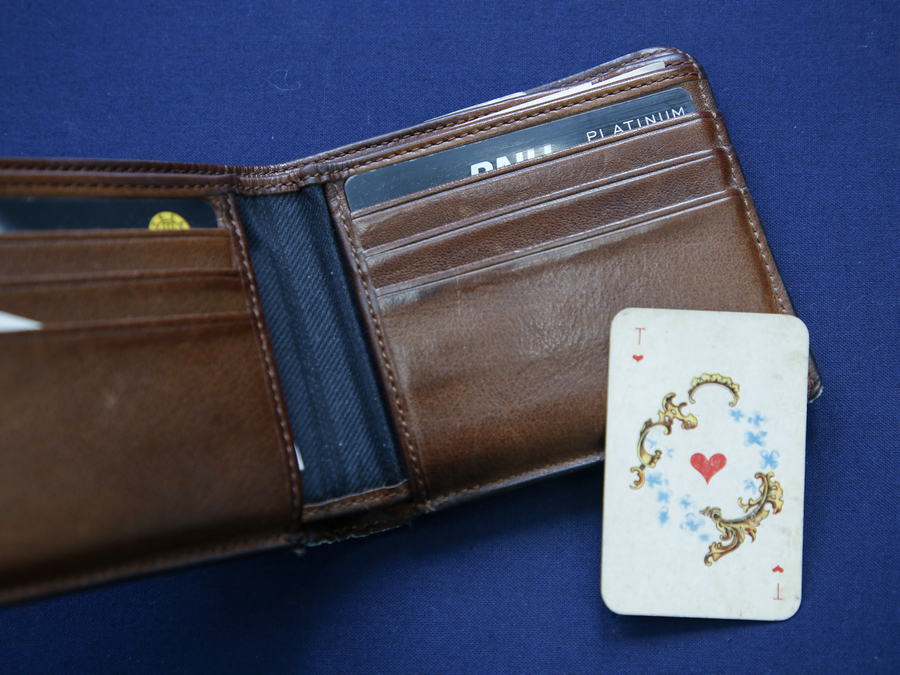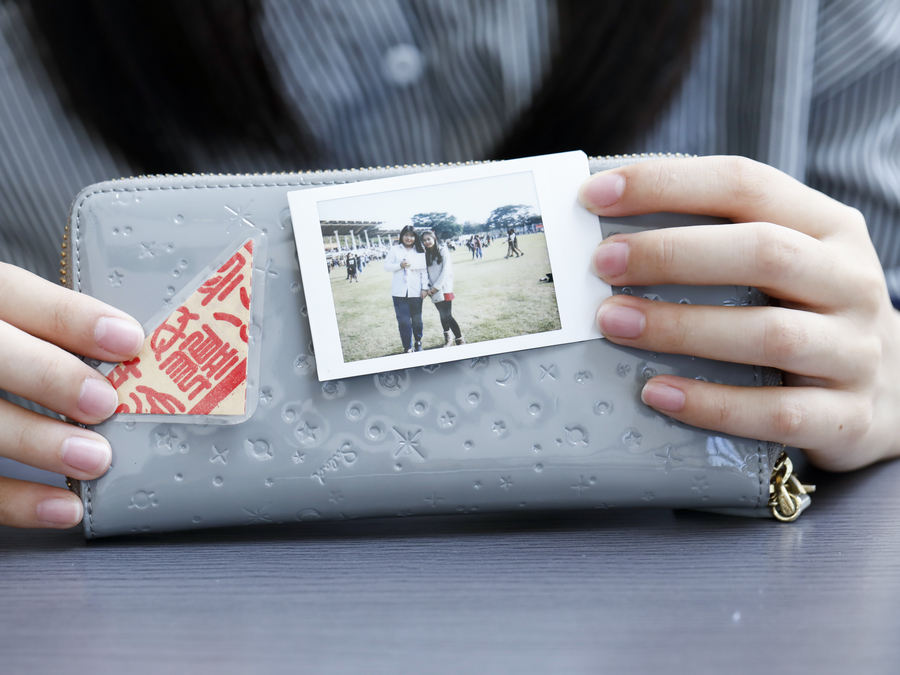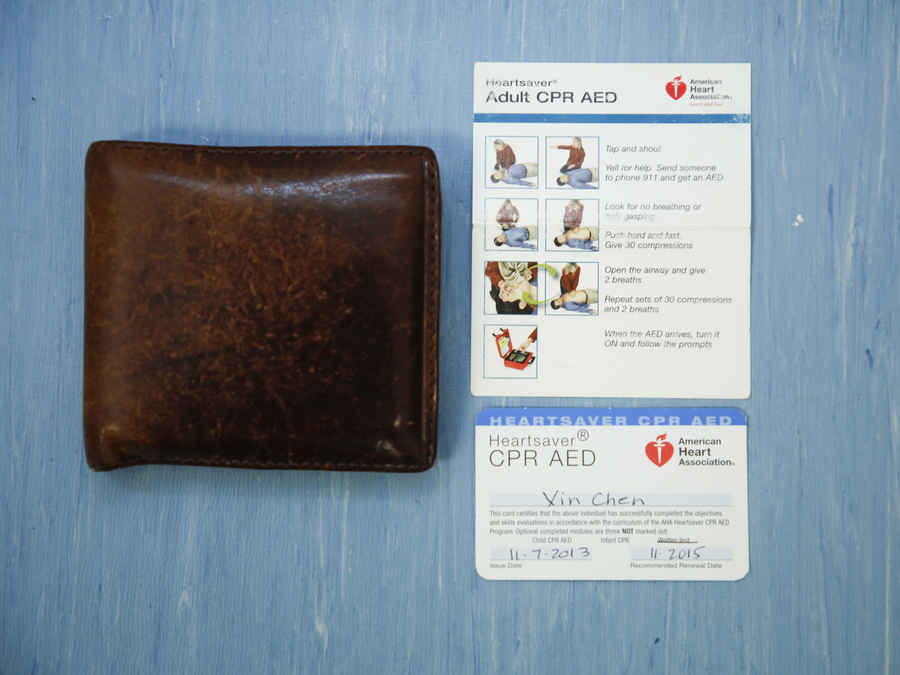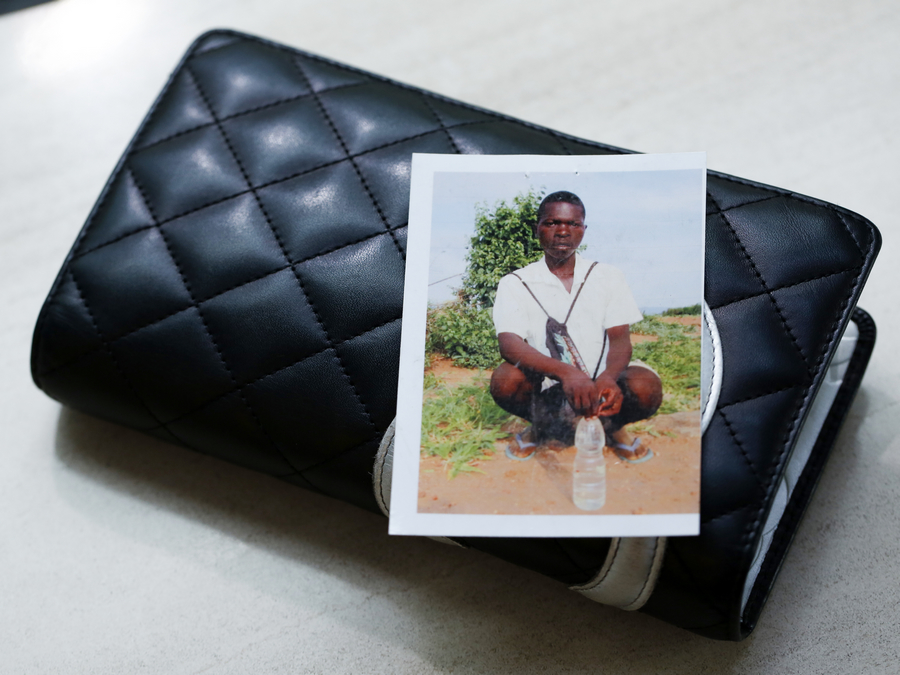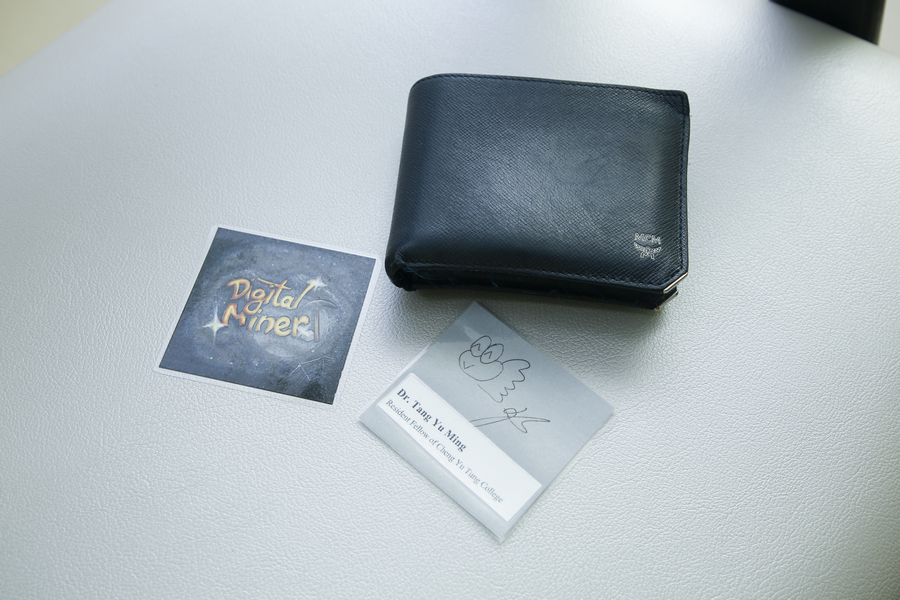Source: My UM
Everyone has a wallet or a purse. What do you usually carry in it besides money and bank cards? In this issue, we interviewed several UM community members, who shared with us the stories in their money pouches.
A Yellowing Ace of Hearts Card
To this day, Prof Yuen Ka-Veng, UM registrar, interim dean of the Faculty of Science and Technology, and an expert in structural engineering, still keeps a yellowing Ace of Hearts poker card in his wallet. He bought the card in 1992, in Moscow, where he participated in an international math competition as a high school student. He visited the local flea market with his classmates, and stumbled upon this set of cards, with beautiful patterns which immediately caught his eye. ‘The letter “T” on the card means “Ace”, which makes it very unique,’ says Prof Yuen. ‘Ace of Hearts is usually considered to bring good luck. So I decided to keep it in my wallet as an amulet. And before I know it, it’s already been in my wallet for 26 years.’
This ordinary-looking poker card has witnessed the various milestones in Prof Yuen’s life as well as the love story between him and his wife. After graduation from college, Yuen went to Hong Kong to study for a master’s degree. When he graduated from the programme, he decided to travel to the United States to pursue a PhD degree, so he wanted to leave this Ace of Hearts card with his then girlfriend (and now wife). But his girlfriend said to him, ‘You need luck more than I do, so keep it.’ Over the years, Prof Yuen’s life has been quite smooth. Could his smooth life experiences really be attributable to the good luck brought by this card? Had he not bought this poker card, would his life be different today? Yuen replies with a laugh, ‘Yes, my life has been quite smooth over the years, but does it have to do with the poker card? I don’t know. As the old Chinese saying goes, if you believe it, then it is true for you.’
‘If it’s not there, I would miss it a little bit.’
Yu Hui Ju from Taiwan is a first-year student in the Faculty of Business Administration. She keeps an amulet and a photo in her purse. Every year, her father would visit a Buddhist temple before the Chinese New Year to pray for peace and safety and obtain amulets for everyone in the family. During the Chinese New Year, they would burn the amulets from the previous year, a ritual that signifies that all the bad things from the previous year are also destroyed in the fire. After that, her father would make sure that all family members put the new amulets in their money pouches.
Yu started this habit of putting a new amulet in her purse every year in middle school. ‘This has become a habit to me. I often think of it, and if it’s not there, I would miss it a little bit,’ she says. Another fixture in her purse is a photo of her with one of her high school classmates. Asked why she doesn’t keep a photo with her parents in the purse instead, she says, ‘Because I never had any instant photos with my parents. This one is an instant photo, so I put it in the purse after we took the photo. And it has stayed with me to this day, even though I have changed my purse several times.’
Always Be Ready to Help Those in Need
Prof Chen Xin from the Institute of Chinese Medical Sciences is an expert on immunology and Chinese medicine. He keeps in his wallet a CPR certificate issued by the American Heart Association and an accompanying instruction card. While in the United States, he obtained the license as an acupuncturist in Maryland. Before joining UM, he worked for a long time as a researcher in the National Cancer Institute in the US.
He explains that CPR training is very prevalent in the US. For instance, the State of Maryland has a law that requires all high school graduates to receive CPR training. Medical workers in Maryland are required to complete CPR training and obtain certification. The National Cancer Institute also encourages staff to receive CPR training. In the US, many people carry the CPR certificate with them so they can perform CPR in case they encounter someone experiencing cardiac arrest.
Once, while travelling on an airplane, the captain notified the passengers through the public address system that one passenger was in desperate need of first aid. Before Chen could show his CPR certificate, another passenger who had also received CPR training offered to help the person. Prof Chan has kept this certificate in his wallet for several years now. He carries it wherever he goes, because he likes to always be ready to help those in need. Although he hasn’t yet had any chance to use this life-saving skill, he takes comfort in the fact that another thing he always keeps in his wallet—a sticking plaster—has helped people twice.
Fate brought us together
Brenda Lo, a staff member from the Facility Operations and Maintenance Section, graduated from UM’s Department of Communication in 2006. She has sponsored underprivileged African children since she graduated. ‘He was randomly selected to be my sponsored child,’ she says, pointing at the boy in the picture she keeps in her purse. ‘I didn’t specify the sex of the child I wanted to sponsor , as it didn’t matter to me. All these years, I’ve always felt that fate brought us together.’
Every year, the boy sends a picture of himself to Lo, which she keeps in the purse, until it is replaced by a new picture the next year. The boy, who was only six years old when Lo started sponsoring him, is now 18. This year, Lo received a letter from the young man, telling her not to sponsor him anymore, because he is now old enough to take care of himself. ‘I feel so happy for him,’ she says. Over the 12 years of sponsoring African children, Lo has learned to be grateful for the blessings in her own life. ‘I feel very blessed that I live in a city like Macao. If I can manage, I hope to help more people in the future,’ she says. ‘I’m thinking about sponsoring children from other places, maybe those from Southeast Asian countries, because then I will be able to visit them instead of just writing letters with them.’
Digital Miner
Dr Tang Yu Ming a resident fellow of Cheng Yu Tung College, keeps in his wallet a card with the words ‘Digital Miner’ written on the front and his name and drawing on the back. This card belongs to a set of math-learning cards designed by Dr Tang and a group of student volunteers from the college. Dr Tang and his students often need to provide volunteer teaching in primary schools outside of Macao, so he always wanted to develop a fun way to teach math to primary school students. Last year, they started to study mathoriented teaching materials from Macao and neighouring regions, which led them to design this set of mathlearning cards. Dr Tang explains that they designed four sets of cards, each with their own rules, to help primary school students in the first three grades to develop number sense and learn the four arithmetic operations.
Members of the team who had a part in designing the cards each randomly took one card from the first Digital Miner set and put it in their wallet for commemorative purposes. ‘I find it especially meaningful, so I always keep it in my wallet. This way, I can take it out any time I want to promote our math-learning cards,’ says Dr Tang. According to Tang, for students to become fluent at the four arithmetic operations, they need to complete about 10,000 exercises, but many students get bored at the 3,000 or 4,000 mark, some even get to the point of hating or fearing maths. This game designed by Dr Tang’s team provides a fun way for students to finish the 10,000 exercises without even realising it. Confident that this card game not only will not wear out the students’ patience for learning, but could even ignite their interest in math, Dr Tang plans to promote it in Macao.’We have already started contacting associations and some teaching centres in Macao. Hopefully we can arrange for local primary school students to learn how to play the cards this summer,’ he says.


